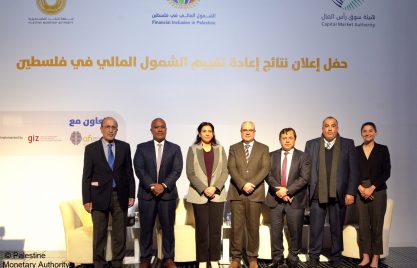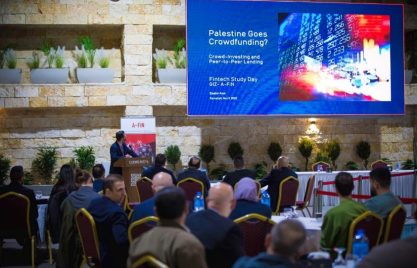Subsequent to the third Steering Committee meeting on the development of a National Financial Inclusion Strategy (NFIS) in the Palestinian Territories, Mr. Azzam Ash-Shawwa took time for an interview with MFMR. The interview was held by Thomas Rahn on May 17th 2016 in Ramallah.
In late 2015, Mr. Shawwa was appointed as the new governor of the PMA, succeeding Dr. Jihad Khalil Al-Wazir who held this position for almost eight years. Mr. Shawwa is an accomplished Palestinian banker and public sector figure. Naming only a small selection of his activities, he had been Minister of Energy, General Manager of the Palestine Commercial Bank, and an active member of the Palestine Investment Fund’s Board of Directors. He was born in Kuwait and grew up in Gaza City. In 1988, he graduated in Memphis, Tennessee, receiving a degree in mathematics with honors.
GIZ: Governor Azzam Shawwa, governor of the Palestine Monetary Authority, it’s a pleasure to have you here with us today. We are just coming out of the Financial Inclusion Steering Committee meeting. So, dear Mr. Azzam, what would you say are your key takeaways from today’s reunion?
Governor: Well, thank you very much for all the effort that’s been done by GIZ so far, in this project and other projects. What I saw today at the meeting is that, first of all, the outcome [of the NFIS, editor’s note] is strongly supported by the committee; that’s really very important. I would say also that financial inclusion is becoming more of a project that’s going to be part of the whole Palestinian institution, which is – this is also very important – not something we just talk about in the PMA, no, no, but now different organizations and institutions, as we saw in the meeting, are really adapting to our story. And, all the stakeholders are getting in full support of financial inclusion to be a strategic priority in Palestine.
What is the PMA’s main motivation to invest money, time, and efforts into financial inclusion?
Worldwide, central banks are the leader or the main player for financial inclusion. And that’s why the PMA also in Palestine is playing the major role. Finally, we are a partner of everybody, but we are taking the lead because this project is part of the financial stability. That is very important; the main mandate of the PMA is financial stability. And, by partnering with all these institutions, if it’s private or government, I would say we are passing the message through this committee, and eventually through this network we have a better service for everybody in Palestine. Since still we are not reaching out to the whole population. Hopefully, through this committee, the PMA can reach out to make all the different kinds of services available for the general public.
And, hearing this, where do you expect the highest impact of the National Financial Inclusion Strategy to be?
I would say that it’s going to be through SMEs, that’s very important, and also through the women aspect. We will see more financial inclusion particularly in these two segments. Besides, probably other people as well will be benefiting from improving the services. Getting more feedback on products in the banking sector, they will look at them again, especially when a better quality of products is offered.
What are the most important actions to be taken or the milestones to be achieved over the next five years? [Editor’s note: The level of financial inclusion currently is at 24% according to World Bank’s Findex data.]
The PMA and PCMA have designated staff, not just time and effort; we have designated staff to be part of this committee. Thus, when we launch such a big project, meaning the whole community is serious about it, then of course we would like to see it happen. And again, the more the involvement of everybody, in five years, we will see both a better financial stability and a higher level of financial inclusion. We are hoping that roughly 50% of the population will be part of the financial inclusion by the year 20…, not just 5 years, by the year 2025. That’s the vision for the short and long term.
Azzam Shawwa, governor of the Palestine Monetary Authority, we thank you very much for your time. – Shawwa: Thank you. – And thank you very much for the PMA’s efforts in this regard with financial inclusion. As you know, the GIZ will continue to be your development partner. And we are looking forward to it. – Shawwa: Thank you.
Edited by Marc Sindlinger



